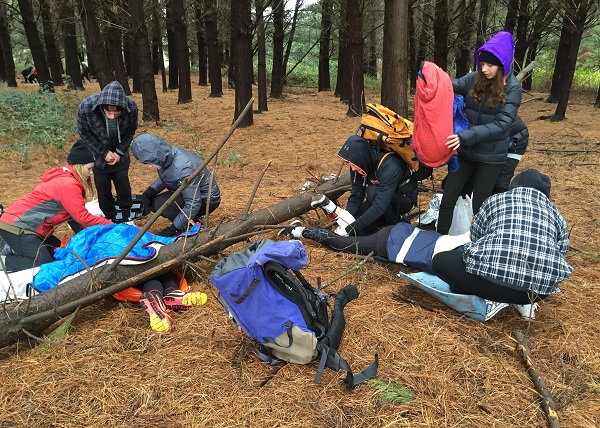
Teachers and students need to learn the ropes of First Aid
When I worked for a group of preschools, one of our four-year-olds saved his mother’s life. She had slipped into a diabetic coma and, after many hours of being unable to rouse her, the child had remembered instructions from police who had visited the preschool a couple of weeks earlier. “You dial 111 for help when there’s a fire or someone’s sick,” he recalled and, in textbook fashion, saved a life.
This is first aid in its purest form – lifesaving help until medical expertise is available – and illustrates the importance of teaching even very young children some basic ways to cope with illness and injury.
In a school awash with active children, accidents and emergencies are inevitable and it is therefore vital that good first aid knowledge is on hand. There are a number of training courses available to teachers and students to help schools stay safe.
And as Worksafe New Zealand points out, schools are required to do more than protect children and young people, teachers and other school staff have the same right to a healthy and safe work environment as the people using their services. Including first aid training in your workplace health and safety program helps you meet your obligations and show employees that you care about their well being.
First Training provides courses in first aid education to students and teachers in a range of destinations throughout New Zealand.
“We specialise in four-hour FASE (first aid for the school environment) courses for teachers covering the basics in dealing with accidents or incidents in the classroom, playground or in EOTC activities,” says managing director Jo Verheijen.
Other courses are on offer too, ranging in length from one hour to three days, with all covering the basics of accident management, CPR, choking, bleeding, severe allergic reactions, medical conditions and injuries that are common in schools. “We run courses at a time to suit your group on week days and weekends, and all over New Zealand.”
St John also offers training courses for teachers, either a one day First Aid Level 1 or a Level 2 course lasting one and a half days for those who go on school camps or work in a technology class, for example. However, tailored workshops can be arranged by request.
“We teach everything from dealing with anaphylaxis to managing multiple casualties, recognising a broken bone and dealing with a badly bleeding cut. Anything can happen at school – and often does,” says Carole Mudford for St John. The good news is that first aid has gotten a lot simpler in the past two years, and a lot more common sense. “Did you know that you can share your asthma inhaler with a person suffering asthma if they don’t have one?”
“The St John in Schools programme provides learning experiences for pre-school, primary and intermediate school-aged children to empower them to act in an emergency. Community educators visit schools in many parts of New Zealand to provide young people with the skills and confidence to take action in response to an emergency situation.” The programme, known as Safe Kids, recognises the ability of children – of all ages – to make a difference in an emergency situation.
Modules on offer include responding in an emergency, disaster preparedness, accident prevention and injury care, and camping. The organisation is also developing new modules in caring for children and leadership, and caring in your community.
“Within each of these modules we have different levels available to cater to all different age groups and learning abilities. Each of the sessions are usually between 45-90 minutes long per class. The St John in Schools programme provides learning experiences for students that relate to the key learning areas of health and physical education, and science in the New Zealand school curriculum,” says Ms Mudford.
Fundraising and grants mean that the programme is free to schools, although a gold coin donation is sometimes requested.
First Training also offer courses to students in years eleven, 12 and 13 about first aid in the work place. Successful completion of these courses earns the student NCEA credits. “For students and NZQA units we are a registered private training establishment (PTE) with a category one status for our external evaluation reviews (EERs). We follow the New Zealand resuscitation guidelines and NZQA requirements for NCEA credits. We make these courses practice, hands-on and interactive so actually remember first aid and have the confidence to respond in an emergency situation.
The much-delayed English draft curriculum is now out for consultation, generating discussion from teachers.
Research from AUT demonstrates arts, culture and recreation have positive impacts on all aspects of…
How effective has the school phone ban been in achieving its aims? Researchers from the…
School camps and excursions deliver hands on learning experiences, helping to consolidate classroom learning.
Innovations in AV technologies present new opportunities to engage with students. We look at how…
A new report from the University of Auckland’s Our Voices Project asks young people what…
This website uses cookies.